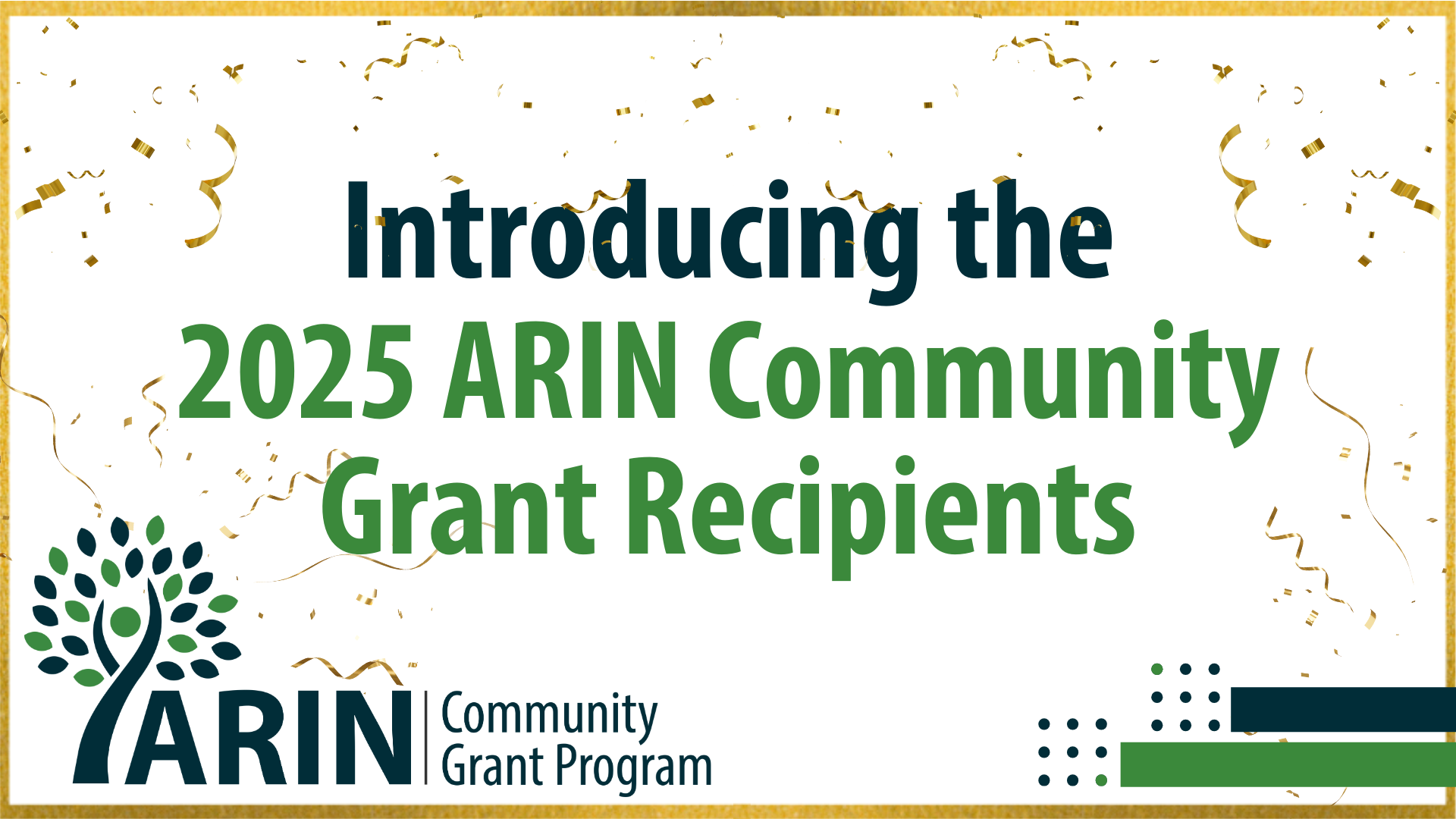
Meet the 2025 ARIN Community Grant Recipients
Now in its seventh year, the ARIN Community Grant Program funds projects that strengthen the Internet and contribute positively to the Internet community in the ARIN region. We are pleased to announce our 2025 grant recipients and share their summaries of the impactful projects they will be working on.

Augmenting GNU AutoGen to Support Hugo Markdown as a Documentation Stanza Markup Format
Network Time Foundation | Talent, Oregon, USA | Grant amount: US$14,000
The NTP Project’s Reference Implementation has been evolving for more than 40 years. The codebase was first documented using plain text files and man pages. We added HTML pages next and then the beginnings of “documentation book” content. The original codebase used ad-hoc command line options processing and had no –help text. These separate copies of manual pages, HTML pages, command-line options, program usage notes, and overview documentation took a lot of time and effort to keep synchronized.
When we converted the codebase to use GNU Autogen we gained several benefits:
- Consistent and reliable options processing –help text
- Consistent generated manual pages in man, mdoc, html, and texinfo documentation, all produced from a single set of “master stanzas”
Since then, we’ve rewritten our WordPress, downloads, documentation archive, and static sites to use Hugo. We want a single “source” for all our documentation, and the next step toward this goal is to add Hugo markdown as a supported markup type in GNU AutoGen. Once we have this capability, we can reorganize our documentation using a single “source” instance for each significant piece of documentation and then more easily and simply maintain and generate all our documentation targets.

IPv6 Test Pod
Internet2 | Ann Arbor, Michigan, USA | Grant amount: US$16,000
As world adoption of IPv6 continues, many applications are being tested and operated in dual-stack networks; however, dual-stack is not a stopping-point for IPv6 adoption. Work needs to begin testing applications and services in environments where IPv4 is being retired, these include networks that use DNS64/NAT64 to provide client access to IPv4 networks, as well as networks that only have IPv6 access. Setting up these test networks can prove a challenging barrier for many, especially those without a networking background.
The IPv6 Test Pod project seeks to purchase, configure, and distribute small inexpensive Wi-Fi routers to additional applicants who wish to test applications in dual-stack, IPv6-only, and 464XLAT environments. The devices require minimal setup, provide separate Wi-Fi SSIDs to connect to each environment, and require only a basic Internet connection to work, even if IPv6 is not natively available. The devices will work in a variety of environments, including behind IPv4-only NAT networks. The project will also provide a tunnel termination service to provide IPv6 network access.

From Raw to Ready: Visualizing RDAP with RegCtl
20C | Chicago, Illinois, USA | Grant amount: US$20,000
This project is a follow-up to the previously funded ARIN Community Grant that supported the development of RegCtl, a command-line tool that normalizes RDAP data from global Internet registries. Building on that foundation, we now propose to develop a modern, responsive web interface for RegCtl, making its normalized registry data broadly accessible and easy to use.
Accessing and interpreting registry data remains challenging due to inconsistencies across Regional Internet Registries’ Registry Data Access Protocol implementations. This project addresses that by providing a clean, intuitive web front end — built using Vue and Vuetify — with dedicated views for Autonomous System Numbers, IP addresses, prefixes, and domains. Users will be able to search and navigate by identifier, with consistent formatting and contextual explanations that enhance understanding.
By improving usability and visibility of standardized registry data, this project supports ARIN’s mission to promote technical clarity, transparency, and responsible resource management. The web interface will display both raw and normalized data and will serve as a valuable educational and operational tool for network operators, researchers, educators, and policy professionals.
The tool will be open source, freely available, and designed for easy integration and extension by the community. Ultimately, it will strengthen the registry ecosystem across the ARIN region and beyond.
Applicant Appreciation
We thank all applicants for their thoughtful proposals and look forward to continuing to support projects that strengthen the Internet and serve the ARIN community.
To learn more about past grant recipients and project outcomes, check out the grant reports published on the blog.
Future Grants
Interested in applying for a grant next year? The 2026 call for applications will be open in the spring, with details on how to apply posted to our ARIN Community Grant Program page and shared via the ARIN Announce mailing list.
We look forward to continuing to make a positive and lasting impact on the Internet together.
Recent blogs categorized under: Grant Program
GET THE LATEST!
Sign up to receive the latest news about ARIN and the most pressing issues facing the Internet community.
SIGN ME UP →Blog Categories
Guest Post • Public Policy • IPv6 • IPv4 • Updates • Fellowship Program • Security • Grant Program • Caribbean • Outreach • ARIN Bits • RPKI • Internet Governance • Tips • IRR • Elections • Training • Data Accuracy • Business Case for IPv6 • Customer Feedback



